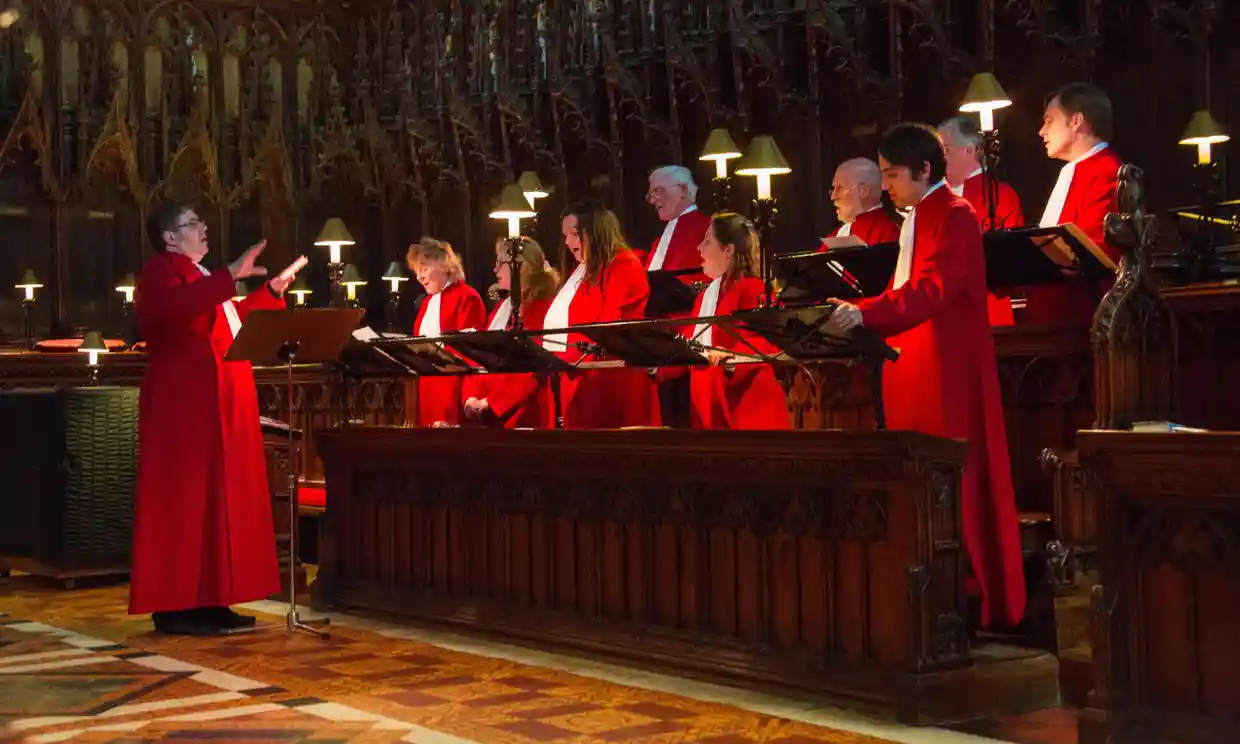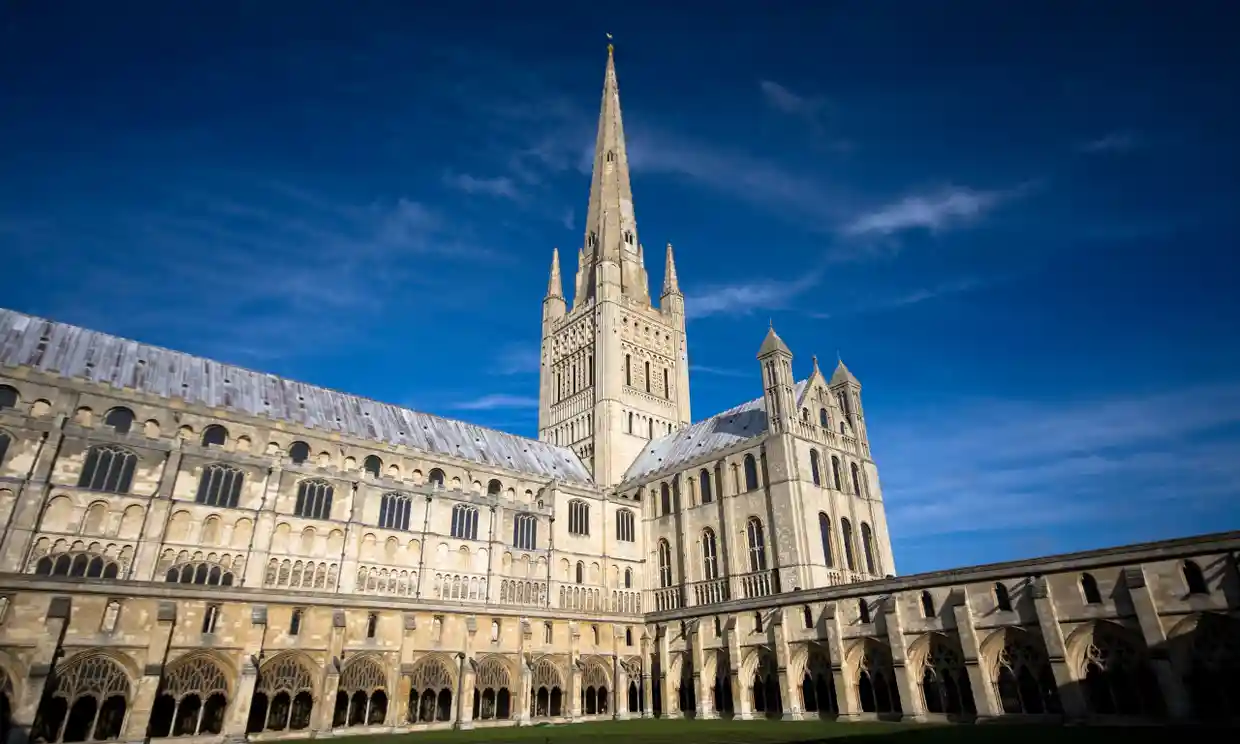 Church Commissioners eases fears for the future
Church Commissioners eases fears for the future
Photo above – Choir practice at Gloucester Cathedral in 2015
With professional singers on furlough and income plunging, a £2m fund from the Church Commissioners eases fears for the future.
For almost four months their voices have been heard only from bedrooms and kitchens instead of soaring from the choir stalls of England’s magnificent cathedrals. Amid uncertainty as to when they will be able to perform again, a growing black hole in cathedral finances from Covid-19 has raised fears about the future of their famed choirs.
But now a financial lifeline is in sight. More than £2m from the Church Commissioners and the Cathedral Choirs Emergency Fund will ensure that the “back row” singers – professionals known as lay clerks – can be funded into next year.
The church commissioners are putting up £1m to match a sum being raised by the emergency fund, 80% of which is already pledged.
“Our tradition of choral singing is second to none in the world,” said Peter Allwood, chair of the Cathedral Music Trust which helped set up the fund. “No other country has the number or quality of choirs within churches, chapels and especially cathedrals. If they were dismantled, it would be an extraordinary loss.”
Cathedrals would struggle to rebuild their income without popular sung services, and would not be able to sustain the same level of musical excellence, he said.
More than 200 leading figures in the music world warned this weekend that religious music was “under serious threat, with some professional choirs already facing permanent disbandment”.
In a further bid to raise funds for struggling choirs, singers from across the UK will unite on Sunday to record a lockdown version of the song Sing Forever. A total of 269 vocalists from 44 cathedrals and choral foundations have filmed their individual vocal parts from their homes which have then been edited into a single video. Former chorister Aled Jones and international opera star Elizabeth Watts will sing a verse.
Choral and congregational singing is still banned because of Covid-19, although places of worship were allowed to resume services last weekend. Most professional singers have been furloughed while cathedrals’ musical directors have kept young choristers singing online. But choral singing is a “team game”, said Salisbury’s director of music, David Halls. “We can rehearse kids virtually, but it doesn’t have as much musical merit,” he said.
Ashley Grote, master of music at Norwich Cathedral, said the pandemic had been a “huge blow” to cathedral music. “Music is very expensive, and there is a very real possibility of cuts. But it does so much to enrich worship,” he said.
Norwich’s choir consists of 20 boys, 22 girls, six professional singers – who have been furloughed – and six choral scholars, or apprentice singers. In normal times, they perform at choral evensong every weekday and twice on Sundays.
“We’re hoping to be able to return to some kind of choral singing in September, but there is a big question mark over that. It would be naive to think we could go straight back to where we were before, but we hope we can begin to take steps.”
 Norwich cathedral, whose master of music says the pandemic has been a huge blow.
Norwich cathedral, whose master of music says the pandemic has been a huge blow.
Adrian Partington, director of music at Gloucester Cathedral, said he was “not worried yet” about losing his choir’s eight back row singers, who are furloughed. “Everyone is thinking hard about how to restructure, and I think we’ll find a way through somehow. It won’t be the same, but we’ll still be here when this is over.”
Anglican cathedrals are set to lose £28.4m in income this year and a further £15.3m next year, according to the Church Commissioners. The figure does not include losses incurred by Westminster Abbey, which is said to be facing a £12m shortfall this year and a £9m deficit in 2021.
The abbey, which costs £50,000 a day to run, is being forced to make cuts. At St Margaret’s, parliament’s “parish church” that is part of the abbey, Sunday worship is ending and musical provision is being reviewed, with reports that its professional choir could be disbanded.
Cathedrals that are big tourist attractions such as St Paul’s, Canterbury, York Minster, Durham and Winchester have seen the biggest falls in income from entrance fees, donations, cafes and gift shops. Revenue from events – a big money-spinner for cathedrals – and endowments has also taken a hit.
“Most cathedrals have furloughed staff, but some will have to be let go as they restructure,” said Adrian Dorber, chair of the Association of English Cathedrals and dean of Lichfield.
His cathedral – which costs £5 a minute to run – is consulting staff on redundancies, which could total a third of pre-Covid roles. “We have to reconcile ourselves to the fact cathedrals will be able to do less.”
Report courtesy The Guardian
First published on Sun 12 Jul 2020
DraggedImage.d1ce332a0d6b42a083b4bf13d062108b.png
DraggedImage.8ff045317a844567a8632de604e36571.png


